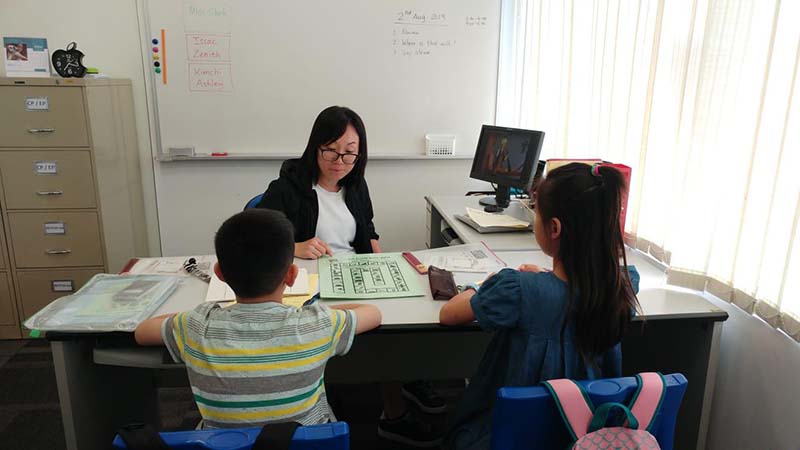Sharing from English Subject Teacher Miss Vicky Shek: Trust and Understanding are Catalysts for Students’ Learning
Sharing from English Subject Teacher Miss Vicky Shek
Trust and Understanding are Catalysts for Students’ Learning

When it comes to learning English, quite a few students with dyslexia will choose to avoid or even dislike it out of feeling helpless and not knowing where to start. To them, English is like an alien language.
After becoming Pathway’s English teacher, Miss Shek noticed that every student with dyslexia has his/her different needs, with varying learning ability and difficulty. That is why she starts by understanding the student’s psychological condition.
“Every student has his/her strength and weakness, and students with special education needs often resolve to negative behaviour as an expression of their shortcomings or fear. As long as the teacher does not form conclusions about them based on their behaviour, or negate that they also have a desire to learn, trust and understanding will eventually develop and become catalysts in the students’ learning.”
Miss Shek recalls her experience when she provided in-school support at a secondary school and how impressed she was about the changes that occurred in one of the boys.
“John* was a Form One student. He was a typical boy who liked to appear strong, and created for himself an image of being ‘a little bully’. At first John was always causing trouble in class and arguing with his classmates, but gradually he became eager to learn and was the first one to arrive for class. His worksheets also became much neater! I was extremely pleased and appreciative to see this change because it reassured me that my teaching was effective.”
Before joining Pathways, Miss Shek had taught secondary school students with special learning needs such as autism, hyperactivity and a minor degree of reading and writing difficulties. She admires Pathways’ small group approach in teaching 2-3 students per class, and feels that the students here are quite lucky to receive the individualized intervention support which was much needed.
Overcome Difficulties One Step at a Time
And then there was another Pathways student Ken*, a Primary Five student who was caring and clever. He was prefect and boy scout at school, and was also part of the elite class; who would have thought that Ken had to deal with the helplessness and difficulties typically faced by students with dyslexia?
“English reading and spelling cause Ken great frustration, and he often tries to avoid them. He still has a lot of room for improvement. I hope he will not give up, and will strive to manifest his talents in other areas.”
Miss Shek often encourages her students to face difficulties with courage.
“No matter how unwilling you are, you have to continue to take forward steps and keep going, even though it may be small bird-like steps. No matter how big the challenge ahead is, you must try to overcome it one step at a time. For example, if you cannot remember the pronunciation of certain words, use your mobile phone to record its sound; if you have difficulty reading a whole paragraph, start with one sentence. If you dislike reading English, watch a TV show or a movie. Reading comics can also be a good way to learn!”

Importance of Collaboration with Parents
Besides the student’s own effort and hard work, it is important to collaborate with parents.
“Every parent who sends their child to Pathways is caring, and is willing to work together with the teacher to help their children continue their learning at home. There were parents who told me, “Miss Shek, xx is doing better in his dictation, or xx’s examination scores have improved, thank you!” And I replied, “That is a result of your child’s hard work, your praise should go to him/her.”
Miss Shek continued to explain that parents and teachers of children with dyslexia in most cases can only “see” their learning difficulties, but not really “feel” it personally. If their child works hard and succeeds, parents should give clear verbal encouragement; if the child has tried but is not making it yet, parents should continue to show support with patience and love.
This year, face-to-face class was often disrupted by the pandemic, and students often had to take lessons from home. This brought great challenge for students with attention deficiency. In order to motivate their concentration in front of the computer monitor, the teacher has to spend time to create and design more class activities, and to break learning units down into smaller parts.
”For example, for regular reading activity, I will record the content in advance and use it for listening exercise material. After showing the video and introducing the new vocabulary, I will ask the students to do one or two listening exercise, before reading the sentences or short paragraphs for the students to check their answers. This makes the students more willing to read,” Miss Shek explained.
The thoughtfulness behind Miss Shek’s teaching is well appreciated by her students and their parents.
*pseudonym
Source from 2019-20 Annual Report
